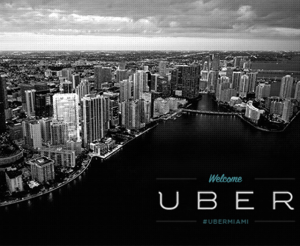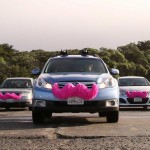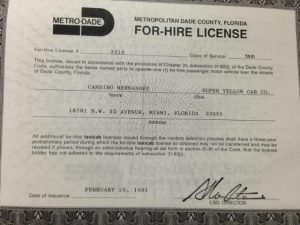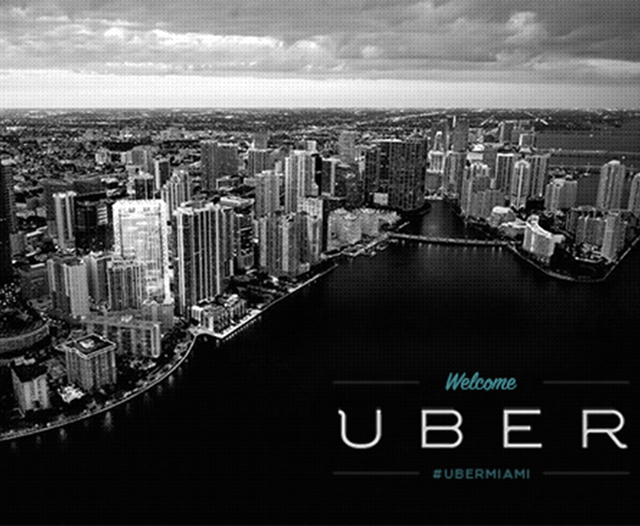(Continued from previous page)
fines — a number that would grow with each and every citation (if the county was actually enforcing the law), since it amounts to 45% or so of their fines.
Read related story: Carlos Gimenez moves to legalize Uber, pardon penalties
But beyond that piece of corporate welfare, which the mayor does not have the votes to pass, the ordinance is far more complicated than it looks.
“I have to say from working on the issue before that there are going to be a lot of deal breakers,” Annunziato told Ladra adding that the  legislation was written by the new (read: inexperienced) director of the transportation department and has not been reviewed by county attorneys. “I told them, ‘Have you really done your homework?”
legislation was written by the new (read: inexperienced) director of the transportation department and has not been reviewed by county attorneys. “I told them, ‘Have you really done your homework?”
Uber and Lyft, for example, are going to object to having to go through the same physical examinations and drug testing for drivers that cabbies undergo and they do not want to have to provide any information to the county on request. They are going to hate the county’s right to audit and the requirement that they justify their rates based on time or distance or a combination of both.
The taxi industry — which has been complaining loudly about these outlaws encroaching on what was once their sacred monopoly — is not going to like it that each individual driver may not have to get a chauffeur’s license or that Uber and Lyft drivers can still charge whatever they want while cabbies have a meter that is set by county fares. They won’t like that Uber and Lyft drivers don’t have to undergo the same county background test they are subjected to.
Then there are too many unanswered questions to formulate any real, thoughtful public policy, Annunziato said.
Should the county carve out areas that are for taxis only, like the airport and seaport, in order to give the medallion owners some value for the medallions they spent hundreds of thousands on that are now worth nothing? Will that be enough to thwart any lawsuits on the taking of property rights? Should TNEs be allowed to stage near other passenger-rich areas like hotels and Miracle Mile or Lincoln Rad and pick up by hail like taxis can? Or should they be restricted to mobile hails? Is the county going to limit the number of cars, like the county has traditionally done with taxis, of which there are about 2,100 (vs. about 15,000 part-time Uber vehicles, according to the company)?
and seaport, in order to give the medallion owners some value for the medallions they spent hundreds of thousands on that are now worth nothing? Will that be enough to thwart any lawsuits on the taking of property rights? Should TNEs be allowed to stage near other passenger-rich areas like hotels and Miracle Mile or Lincoln Rad and pick up by hail like taxis can? Or should they be restricted to mobile hails? Is the county going to limit the number of cars, like the county has traditionally done with taxis, of which there are about 2,100 (vs. about 15,000 part-time Uber vehicles, according to the company)?
“We have to figure out whether or not it’s a good policy to flood the market with all these new cars,” Annunziato said. “We can’t even get past the question of whether or not to put more cars on the road.”
And if that happens, should the county also issue more taxi medallions? Would anybody buy one?
Read related story: Miami-Dade should give medallion money back to cabbies
One of the big questions should also be why the mayor has a fire on his, um, feet on this issue? Why would Gimenez so hastily push something through that has no t even been vetted by the county attorney’s office?
t even been vetted by the county attorney’s office?
The strong mayor does not write legislation, as Monestime so aptly noted. Legislation is normally drafted at the direction of a voting member of the commission who can then submit it to the chairman to put on the agenda. Why on Earth is Gimenez spending so much time on something that — next to Liberty Square Rising and sea level rise and everything in between — seems to be so inconsequential? Why does he have to be the lead?
Some people think that it’s campaign related. He wants to say he delivered on his promise to legalize Uber and Lyft by the end of the year. This is a “winning issue,” as mayoral spokesman Mike Hernandez said, referring to a poll that showed 70% of respondents — most of whom do not understand the complicated factors involved, like commercial insurance coverage and property right liabilities — said they supported legalizing the ride sharing companies. The issue resonates with millennials, a voter bloc Gimenez has not made gains with but who are likely to come out in a presidential election with a Hillary Clinton on the ballot.
Others say he is embarrassed that Broward County got their act together faster than Miami-Dade.
Still others say he’s getting gifts, contributions from those involved and fundraising help from lobbyists Brian May (Uber) and Jorge Luis Lopez (Lyft).
But whatever the reason, the haste to get this done on an artificially-created and campaign-centric timeline is probably why the ordinance is far from ready to present to the commission. And Bovo has put on the brakes.
Annunziato told Ladra he had sent it to legal for review, but he has no intention of bringing it to a public meeting until after the new year.
There’s one thing he knows already, though: “I’m not certain you can make everybody happy,” Annunziato said.
Pages: 1 2

